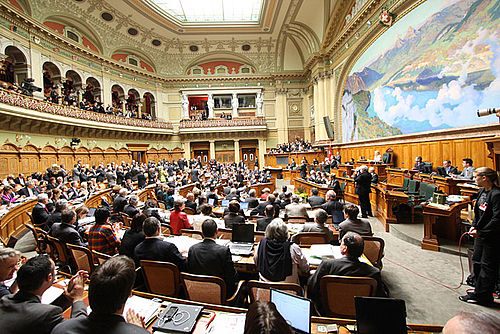Congressnoun
(archaic) A coming together of two or more people; a meeting.
Congressnoun
A formal gathering or assembly; a conference held to discuss or decide on a specific question.
Congressnoun
(often capitalized: Congress) A legislative body of a state, originally the bicameral legislature of the United States of America.
Congressnoun
An association, especially one consisting of other associations or representatives of interest groups.
Congressnoun
Coitus; sexual intercourse.
Congressverb
(intransitive) To assemble together.
Congressverb
To meet in a congress.
Congressnoun
A meeting of individuals, whether friendly or hostile; an encounter.
Congressnoun
A sudden encounter; a collision; a shock; - said of things.
Congressnoun
The coming together of a male and female in sexual commerce; the act of coition.
Congressnoun
A gathering or assembly; a conference.
Congressnoun
A formal assembly, as of princes, deputies, representatives, envoys, or commissioners; esp., a meeting of the representatives of several governments or societies to consider and determine matters of common interest.
Congressnoun
The collective body of senators and representatives of the people of a nation, esp. of a republic, constituting the chief legislative body of the nation.
Congressnoun
The lower house of the Spanish Cortes, the members of which are elected for three years.
Congressnoun
the legislature of the United States government
Congressnoun
a meeting of elected or appointed representatives
Congressnoun
a national legislative assembly
Congressnoun
the act of sexual procreation between a man and a woman; the man's penis is inserted into the woman's vagina and excited until orgasm and ejaculation occur
Congress
Congresses are formal meetings of the representatives of different countries, constituent states, organizations, trade unions, political parties or other groups. The term originated in Late Middle English to denote an encounter (meeting of adversaries) during battle, from the Latin congressus.
Parliamentnoun
A formal council summoned (especially by a monarch) to discuss important issues.
Parliamentnoun
In many countries, the legislative branch of government, a deliberative assembly or set of assemblies whose elected or appointed members meet to debate the major political issues of the day, make, amend, and repeal laws, authorize the executive branch of government to spend money, and in some cases exercise judicial powers; a legislature.
Parliamentnoun
A particular assembly of the members of such a legislature, as convened for a specific purpose or period of time (commonly designated with an ordinal number – for example, first parliament or 12th parliament – or a descriptive adjective – for example, Long Parliament, Short Parliament and Rump Parliament).
Parliamentnoun
A gathering of birds, especially rooks or owls.
Parliamentnoun
(historical) Parliament cake, a type of gingerbread.
Parliamentnoun
A parleying; a discussion; a conference.
Parliamentnoun
A formal conference on public affairs; a general council;
Parliamentnoun
The assembly of the three estates of the United Kingdom of Great Britain and Ireland, viz., the lords spiritual, lords temporal, and the representatives of the commons, sitting in the House of Lords and the House of Commons, constituting the legislature, when summoned by the royal authority to consult on the affairs of the nation, and to enact and repeal laws.
Parliamentnoun
In France, before the Revolution of 1789, one of the several principal judicial courts.
Parliamentnoun
a legislative assembly in certain countries (e.g., Great Britain)
Parliamentnoun
a card game in which you play your sevens and other cards in sequence in the same suit as their sevens; you win if you are the first to use all your cards
Parliament
In modern politics and history, a parliament is a legislative body of government. Generally, a modern parliament has three functions: representing the electorate, making laws, and overseeing the government via hearings and inquiries.

























